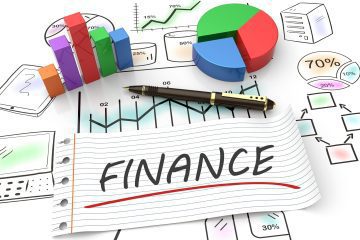In the intricate web of a company’s financial landscape, the role of a finance director stands out as a guiding beacon, navigating the turbulent waters of budgets, investments, and strategic planning. A symphony of numbers and insights, the finance director orchestrates the financial destiny of an organization with precision and foresight. Join us as we delve deep into the world of finance directors, unraveling the complexities and highlighting the essential expertise required to steer the financial ship towards success.
Table of Contents
- – Mastering the Role of a Finance Director: Key Responsibilities and Challenges
- – Strategies for Effective Financial Planning and Budgeting as a Finance Director
- – Building Strong Cross-Functional Relationships for Success in Finance Leadership
- – Leveraging Technology and Data Analytics in Finance: A Finance Director’s Guide
- Q&A
- Final Thoughts


– Mastering the Role of a Finance Director: Key Responsibilities and Challenges
Assuming the pivotal role of a Finance Director is akin to conducting a financial symphony, harmonizing the fiscal strategies of an organization. Steering the financial ship requires a dynamic skill set encompassing strategic vision, analytical acumen, and leadership finesse.
From optimizing capital structure to mitigating financial risks, a Finance Director’s responsibilities are multifaceted. This includes:
- Financial Planning: Crafting comprehensive financial plans aligned with organizational objectives.
- Performance Analysis: Analyzing financial performance metrics to drive informed decision-making.
- Compliance Oversight: Ensuring adherence to regulatory standards and financial best practices.
| Year | Revenue | Profit |
|---|---|---|
| 2020 | $5,000,000 | $1,200,000 |
| 2021 | $6,500,000 | $1,800,000 |
Despite the challenges that may arise, such as economic uncertainties or regulatory changes, a skilled Finance Director navigates these complex waters with agility and precision, ensuring the financial stability and growth of the organization.
– Strategies for Effective Financial Planning and Budgeting as a Finance Director
Strategies for Effective Financial Planning and Budgeting as a Finance Director
As a finance director, mastering the art of financial planning and budgeting is crucial for steering your organization towards success. One key strategy is to conduct in-depth financial analysis regularly to identify trends and anticipate future financial needs. By leveraging **data-driven insights**, you can make informed decisions that align with your company’s goals and objectives.
Furthermore, **collaborating** with department heads and key stakeholders can enhance the budgeting process. Engage in open discussions to gather valuable input that reflects various perspectives within the organization. This collaborative approach not only fosters **transparency** but also ensures that budgets are **realistic** and **attainable**.


– Building Strong Cross-Functional Relationships for Success in Finance Leadership
In the dynamic landscape of finance leadership, the ability to foster strong cross-functional relationships is paramount. Collaboration across departments not only enhances operational efficiency but also drives strategic decision-making. By cultivating a culture of communication and mutual respect, finance directors can bridge gaps between teams and align efforts towards a common vision.
Embracing diversity of thought and expertise is key to unlocking innovative solutions and maximizing performance. Leveraging the unique strengths of individuals from different departments can lead to breakthroughs in problem-solving and optimization of financial processes. Through regular interactions, active listening, and a shared commitment to organizational goals, finance directors can build bridges that withstand challenges and propel their teams towards success.

– Leveraging Technology and Data Analytics in Finance: A Finance Director’s Guide
In the realm of finance, the marriage between technology and data analytics has revolutionized the way in which financial decisions are made. As a finance director, embracing this technological shift is paramount to staying ahead in a rapidly evolving landscape. By leveraging cutting-edge tools and harnessing the power of data analytics, finance directors can unlock valuable insights that drive strategic decision-making and enhance overall financial performance.
Benefits of leveraging technology and data analytics in finance:
- Enhanced Decision-Making: Real-time data analysis enables finance directors to make informed decisions promptly.
- Risk Management: Utilizing predictive analytics helps in identifying and mitigating potential financial risks proactively.
- Cost Optimization: Streamlining financial processes through automation leads to cost savings and operational efficiency.
| Key | Benefits |
|---|---|
| 1 | Enhanced Decision-Making |
| 2 | Risk Management |
| 3 | Cost Optimization |
A: A finance director plays a pivotal role in overseeing the financial operations of a company. They are responsible for financial planning, budgeting, monitoring cash flow, analyzing financial data, and ensuring compliance with regulations.
Q: What skills are essential for a finance director?
A: Strong analytical skills, financial acumen, decision-making abilities, leadership qualities, and excellent communication skills are crucial for a finance director. They should also have a deep understanding of financial systems and regulations.
Q: How does a finance director contribute to a company’s success?
A: A finance director’s strategic financial insights and decision-making can have a significant impact on a company’s profitability and growth. By providing accurate financial analysis and guidance, they help steer the company towards achieving its financial goals.
Q: What challenges do finance directors typically face?
A: Finance directors often face challenges such as navigating economic uncertainties, optimizing financial processes, managing risks, and balancing short-term financial needs with long-term strategic objectives. Adapting to regulatory changes and technological advancements is also a common challenge.
Q: How can someone become a finance director?
A: To become a finance director, individuals typically need a strong educational background in finance or accounting, relevant work experience in financial management or leadership roles, professional certifications (e.g., CPA, CFA), and a track record of delivering results in the financial domain. Continuous learning and professional development are key to advancing in this career path.
Final Thoughts
As you navigate the complex world of financial management, having a skilled finance director by your side can make all the difference. From strategic planning to budgeting and financial analysis, the role of a finance director is crucial for the success of any organization. By understanding the nuances of finance, this key player ensures the fiscal health and sustainability of the business. So, whether you’re a seasoned financial professional or an aspiring leader in the field, remember that the expertise of a finance director can steer your financial ship towards prosperity. Embrace the power of financial acumen, and watch your organization thrive in the hands of a capable finance director.




0 Comments